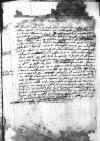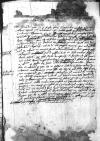Letter #3872
[Ioannes DANTISCUS] to [Samuel MACIEJOWSKI]Heilsberg (Lidzbark Warmiński), [1539-08-01]
English register:
Dantiscus is not happy about Jan Sokołowski’s appointment to the Elbląg (Elbing) castellany. He thinks things would have taken a better turn if it had not been for the addressee’s illness.
Dantiscus appeals for Maciejowski to take care of his health and not take on too much of a burden in his recently assumed chancellor’s post. He is not surprised that his recommendation for the addressee was not effective. He thanks him for the promise of his support against people who slander him.
With reference to information sent earlier, Dantiscus offers a reminder about the ignoble way in which the Bishop of Kulm (Chełmno) [Tiedemann Giese] was treated by certain fellow countrymen, and especially the voivode of Kulm [Johann von Lusian (Luzjański)]. This matter has been recounted extensively to both the addressee and the King [Sigismund I Jagiellon] by Giese as well. Dantiscus asks for support on the matter. He advises that Giese has sent templates he would like to be used as the basis for the royal instructions for the next Diet [of Royal Prussia], the related petitions and the decree against the nobleman from Dobrzyń Land (Ziemia Dobrzyńska) [Moszczyński] who abducted a peasant with all his possessions from one of the villages in the bishopric.
In view of the recurrence of the plague in Kulm Land (Ziemia Chełmińska), Thorn (Toruń) and neighbouring towns, Dantiscus is not sure if the Diet will gather on St. Michael’s Day [September 29]. Rather, he expects the plague to escalate as a result of the ongoing market fairs in Gdańsk (Danzig). Even if the meeting place is changed to somewhere safer, the disease will be spread by the those involved in lawsuits who are coming to the assembly from infected areas.
Dantiscus asks Maciejowski to inform the King that he has accepted the Duke’s [Albrecht I von Hohenzollern-Ansbach’s] invitation to the wedding of the daughter of the Master of his court [Melchior von Kreytzen]. On this occasion, they are to discuss matters related to neighbourly relations. It would have been impolite for Dantiscus to refuse, but he is worried the trip will provoke further slander at the court.
Manuscript sources:
Prints:
| ||||||||
Text & apparatus & commentary Plain text Text & commentary Text & apparatus Excerpts concerning Dantiscus' travels
Reverende Domine, frater et [amice carissime et honorande].
Dominationi Vestrae Reverendae precor ... navatam Dominatonis Vestrae Reverendae ex ... ipsa intellexi, pro qua omnes ... castellanatus Elbingensis adeo sit ... dedecuisset morula quaedam in ea praesertim re ... momenti habetur
Deo gratia, qui nobis Dominationem Vestram Reverendam salvam restituit. Quam ut sic longissimo tempore conservet, intime oro. Ceterum, mi Domine carissime, adnitendum curandumque esset, ne se in huius officii principio pluribus, quam humeri ferre valeant, oneret negotiis sollicitudinibusque non parum salut[i] noxiis, illius diffinitionis
veteris
memor, quam olim a reverendissimo domino meo
Quod commendatio mea non admodum accepta fuerit, ob id aequiore animo fero, quod ab aliis prius maioribus me in rebus iustissimis et reipublicae commodis facta non semel repudiationem repperit. Continuissem quidem me, quemadmodum et cor praesagiebat, si amor in Dominationem Vestram Reverendam reprimi potuisset, qui hoc ipsum, quod a me factum est, vehementia non modica extorsit. Boni itaque suscipiat, oro, quod bona et amica mens suggessit. Prodesse certe, obesse nolui, divina nihilosecius voluntas, quam non obscuris argumentis Dominationi Vestrae Reverendae propitiam esse nosco, irritis etiam osoribus fiet.
Patrocinium suum, quod mihi contra eos, qui me calumniari solent, offert, adeo gratum est, cum exspectationi meae et in re praesenti iam non semel integerrime mihi responderit, ut quid gratius esse valeat, non facile a me inveniatur pro eoque gratias numquam intermorituras habeo sicque me vicissim erga Dominationem Vestram Reverendam geram, ne quid umquam, quod sibi a me praestari velit, desiderare merito possit. Hocque non aulic{a}e etc.
In cf.
Quam diutissime incol[umem] ...atus sui feliciorem esse summopere cupio.
Ex
Postscript:
De
Accedit et aliud, quod per Dominationem Vestram Reverendam serenissimam


